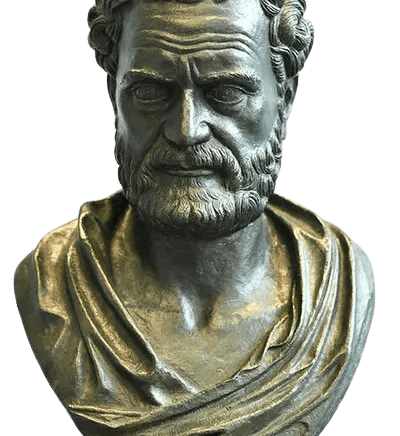Life and achievements
Early life
Democritus, a native of Abdera, a coastal city in Thrace, present-day Greece, was born around 460 BCE. His affluent family background allowed him to embark on a journey of knowledge acquisition, which took him to various philosophical hubs such as Athens, Egypt, and Persia. This early exposure to diverse cultures and philosophies significantly shaped his academic growth and laid the foundation for his future philosophical endeavours.
Democritus's insatiable thirst for knowledge and his eagerness to learn are evident in his extensive travels to Athens, Egypt, and Persia, where he studied under the tutelage of numerous philosophers. This exposure to a wide range of knowledge systems not only broadened his intellectual horizons but also played a pivotal role in the development of his own unique philosophical perspective. While little is known about his early life, his fervent pursuit of knowledge is a defining characteristic of his academic journey.
While comprehensive information about the early lives of Democritus and Leucippus is scarce, it is widely believed that Democritus was a disciple of Leucippus, with whom he co-formulated the atomism theory. The influence of Leucippus's ideas on Democritus's early philosophical development is undeniable, as it provided the necessary foundation for his future work. The early part of Democritus's life was dedicated to learning and discovery, a testament to his commitment to philosophical exploration.
His initial philosophical activities focused on investigating the nature of the world. He wanted to understand the material world through the application of reason and the use of the senses, which was quite different from other scholars of his time who used metaphysical methods.
Legacy
Democritus's main contribution is associated with the development of the atomic theory. He proposed that the universe is made up of small particles that cannot be further divided, which he called atoms. This theory not only enhanced the study of natural philosophy but also paved the way for contemporary scientific investigation.
He has also made significant contributions to the field of ethics and moral philosophy. According to Democritus, the chief good, happiness, is obtained through virtue, temperance, and knowledge. He stressed the virtues of nonviolence and self-control, values that are still relevant in the modern world of philosophy.
Democritus's ideas continued to spread even after his death, and he influenced many philosophers of the coming generations, including Epicurus and Lucretius. He gave a materialistic approach to the atomic theory, which was in contrast to the metaphysical approach prevailing at that time. This view led to future scientific discoveries of the physical environment.
From the fragments that have been preserved, one can see that Democritus was a profound and thoughtful philosopher, although many of his works are lost. His opinions on existence, morality, and the search for truth are topical and encourage people to think. Democritus is one of the most influential thinkers in the history of philosophy; he was an outstanding scientist and a great ethicist.
Milestone moments
Mar 13, 460
Birth of Democritus
Democritus was born in Abdera of Thrace in about 460 BCE.
He was born into a wealthy family, received an excellent education, and travelled extensively.
The philosopher Democritus had relatively diverse early experiences due to his travels and exposure to different cultures and philosophies.
He travelled to Athens, Egypt, and Persia to learn philosophy from the great philosophers of the time.
This period of learning and exploration can be considered the groundwork for Democritus's future development as a philosopher and scientist.
He grew up passionate about acquiring knowledge and learning as much as he could.
Sep 5, 430
Atomic Theory
In early Greek philosophy, around 430 BCE, Democritus, a student of Leucippus, developed the atomic theory.
This revolutionary theory stated that everything in the world is made of small particles that cannot be further divided and are known as atoms.
Democritus's atomic theory was revolutionary in stating that atoms are eternal, of the same kind, and differ only in shape, size, order, and position.
This concept formed the basis of the contemporary scientific explanation of physical reality.
The atomic theory provided a new materialistic approach to explaining phenomena that was different from the metaphysical approach.
The theorist Democritus contributed significantly to the development of natural philosophy in this regard.
May 9, 420
Travels and Studies
Democritus was an active traveller in the 420s BCE; he visited Egypt, Persia, and maybe India.
These travels helped him to gain experience and broaden his vision, which affected his philosophical views.
This made Democritus come up with many different ideas and thoughts because he was exposed to many other knowledge systems and cultures.
He incorporated all these into his own philosophical work and added value in the process.
This period of travel and study was critical in developing Democritus's philosophy and philosophy in general, as it moved away from the more metaphysical approaches to philosophy and towards more empirical and rational methods.
Jul 9, 400
Ethical Writings
Ethics as a subject was developed by Democritus around 400 BCE, and he wrote a lot about it.
He thought that a man could be happy if he was virtuous and moderate and if he developed his mind.
He taught ethical lessons mainly about the need to attain inner serenity and practice self-control.
According to Democritus, understanding and wisdom cannot exist without developing a calm and happy spirit.
These ethical ideas corresponded with his scientific interests, demonstrating his interest in the whole picture of a human being.
The contribution of Democritus in the area of ethics is still relevant in modern society and philosophy.
